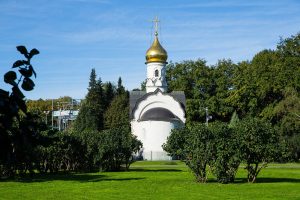Temple-Chapel of St. Basil the Great

The Chapel of St. Basil the Great is located on the territory of VDNKh, in a quiet and secluded place. Regular services are held on its territory, everyone can confess, be baptised and married. Saint Basil the Great was born around 330 in Caesarea, the administrative centre of Cappadocia, and came from a famous family. His father, being an orator and lawgiver, intended Basil for the same path. Basil received an excellent education in Caesarea and Constantinople, and finished it in Athens, where he studied for five years (350-355) in the school of rhetors. There he met and became friends with Gregory the Theologian. The future persecutor of Christians and emperor Julian the Apostate studied with them. On his return to Caesarea Basil devoted himself to secular affairs. At the end of the 350s, after the death of his brother Naucratius, a hermit, he himself was baptised and began a more ascetic life. Together with his friend Gregory the Theologian he settled on the family lands in Pontus, where they studied the writings of Origen. In 356 or 357 Basil embarked on a long journey to Syria and Egypt (Thebaid), after which he resumed his ascetic practice. In 357 he was ordained a priest, after which he remained in Pontus and became active in the life of the church. In 360 as a reader he accompanied the Cappadocian bishops to the Council in Constantinople. In 364 Basil was ordained a presbyter In 365 Basil returned to Caesarea and took control of the diocese. He wrote three books against the Arians, preaching the slogan “three hypostases in one essence”, which was acceptable both to the followers of the Nicene Creed and to those who had recently sympathised with the Arians. Despite the opposition of a number of bishops, after the death of Eusebius in 370, Basil took the place of Metropolitan of Cappadocia and zealously began to eradicate Arianism in Asia Minor. Basil’s anti-Arian activity led him to a clash with Valentus. During the emperor’s journey through Cappadocia, the bishop flatly refused to recognise the correctness of the Arian doctrine. In response, Valentus divided Cappadocia into two provinces, which led to a reduction in the canonical territory of Basil and undermined his position in the Church. Nevertheless Basil managed to promote his associates Gregory of Nyssa and Gregory the Theologian as bishops of key cities. The death of Valentus in the battle of Adrianople changed the balance of power in the state and the church, but Basil had no time to take advantage of it. He died on the first day of the new year 379 and was soon ranked among the saints.
Address: Moscow, Mira Prospekt, 119, p. 500

